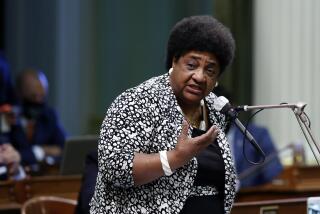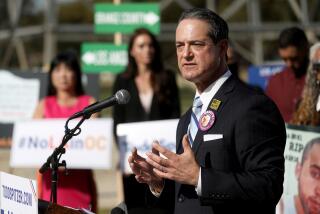Spitzer steps down amid sex scandal
- Share via
NEW YORK — Two days after federal agents publicly identified Eliot Spitzer as a client of a high-priced prostitution ring, the first-term governor announced his resignation at a somber news conference Wednesday, relinquishing his duties to Lt. Gov. David A. Paterson.
Paterson, 53, who will be sworn in as New York’s top state official Monday, will inherit a politically riven Legislature facing a $4.4-billion deficit.
Spitzer -- flanked by his wife, Silda Wall Spitzer, who stood with her hands clasped behind her back -- apologized to his family and supporters during a nearly three-minute speech at his Midtown Manhattan office.
“In the past few days, I have begun to atone for my private failings with my wife, Silda; my children; and my entire family,” he said. “The remorse I feel will always be with me. Words cannot describe how grateful I am for the love and compassion they have shown me.”
Spitzer, 48, a father of three teenage daughters, made the announcement after staying holed up at home for more than 36 hours. The disgraced Democratic politician, who was a crusading state attorney general before being elected governor in November 2006, emerged from his 5th Avenue Manhattan residence surrounded by police just after 11:15 a.m. Spitzer’s wife rode with him in a black SUV to the news conference, where nearly 100 reporters waited for his arrival, helicopters hovering above.
“There is much more to be done, and I cannot allow my private failings to disrupt the people’s work,” Spitzer said.
He ended his statement by offering his prayers for Paterson, whom he called a friend.
Paterson, a Democrat from Harlem who was first elected to the state Senate in 1985, will take on a laundry list of challenges, including passing a state budget by a March 31 deadline.
“He’s entering a situation where the state has almost a $5-billion deficit and an economy that is underperforming,” said Joseph Mercurio, a longtime political consultant in Manhattan. “He’s got to figure out how to keep the state afloat in those conditions.”
Paterson, who has been nearly sightless since birth, will become New York’s 55th governor and the first African American to serve in the position.
In a statement after Spitzer’s resignation, Paterson said: “Like all New Yorkers, I am saddened by what we have learned over the past several days.”
Paterson said he was a close friend of Spitzer and his wife, adding: “As an elected official, the governor has worked hard for the people of New York.”
“It is now time for Albany to get back to work as the people of this state expect from us,” he said.
Also Wednesday, the U.S. attorney for the southern district of New York, Michael J. Garcia, responded to speculation that Spitzer might have been trying to use his resignation as a bargaining chip with federal prosecutors. Garcia said in a statement: “There is no agreement between this office and Gov. Eliot Spitzer relating to his resignation or any other matter.”
Paterson, unlike Spitzer, is known for a calm and collegial personal style. Spitzer’s confrontational and often abrasive personality did not lend itself to political successes in Albany. Lawmakers and analysts expect that working across party lines will come more easily to Paterson, who forged relationships with many Republicans during his 20 years in the state Senate.
“Not only are there partisan fissures that slow things down in Albany, but there are institutional fissures as well,” said Bruce F. Berg, chairman of the political science department at Fordham University.
Paterson “assumes this position under very difficult circumstances,” Berg said. “While all this has been going on with the resignation, you’ve still got interest groups wandering around lobbying the statehouse and Legislature, seeking to get what they want, because this is budget time.”
Paterson will also have to figure out what will become of Spitzer’s proposals for campaign finance reform, for increases in lawmakers’ pay and to redraw legislative districts, among others.
State Senate Majority Leader Joseph L. Bruno, who had clashed repeatedly with Spitzer, said there was a “sigh of relief” in Albany on Wednesday. The scandal had consumed legislators, and Bruno said they must now get back to work on state business and focus on fiscal challenges.
Bruno, a Republican, said he had a good relationship with Paterson and expected to work well with him. Bruno will assume the responsibilities and duties of the lieutenant governor, which include taking over if the governor becomes incapacitated or is out of the state.
“There’s mutual respect,” Bruno said of Paterson. “He’s an experienced individual, fairly liberal but the kind of person you can sit with and talk things through.”
New York Assembly Speaker Sheldon Silver, a Democrat, told reporters Wednesday in Albany that Paterson comes from the Legislature and understands it well. “I don’t think he needs an orientation in terms of that,” Silver said. “He can hit the ground running on Monday.”
Spitzer’s resignation followed revelations Monday -- based on federal wiretaps -- that he spent thousands of dollars for a prostitute known as Kristen on Feb. 13 at a hotel in Washington, D.C. By some accounts, Spitzer may have spent $80,000 during numerous liaisons with employees of the Emperors’ Club VIP call-girl service.
The Emperors’ Club catered to wealthy men seeking beautiful young female consorts in New York, Washington, Miami, London, Paris and Los Angeles. A federal wiretap captured a man identified as “Client 9” -- a regular customer of the Emperors’ Club -- arranging a date with a petite brunet, an FBI affidavit said. Spitzer was Client 9, federal law enforcement officials have said.
In Albany, things came to a standstill Wednesday as legislators watched Spitzer’s resignation on TV.
Assemblyman Richard L. Brodsky, a Westchester County Democrat, said he looked forward to Paterson taking the job. He anticipated that Paterson would move Albany away from the confrontational rhetoric that Spitzer had introduced.
“He impoverished the debate,” said Brodsky of Spitzer, adding that the resignation gave legislators an opportunity to reestablish a more civil discourse. “In the long run, that’s as important as policy.”
As for Spitzer’s future, it is unclear whether he will face charges stemming from the scandal. In his remarks Wednesday, he acknowledged that his political career had been derailed:
“As I leave public life, I will first do what I need to do to help and heal myself and my family. Then I will try once again, outside of politics, to serve the common good.”
--
Times staff writer Louise Roug contributed to this report.
More to Read
Sign up for Essential California
The most important California stories and recommendations in your inbox every morning.
You may occasionally receive promotional content from the Los Angeles Times.










